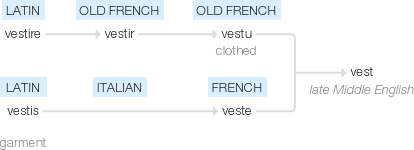Vest
late Middle English (as a verb): from Old French vestu ‘clothed’, past participle of vestir, from Latin vestire ; the noun (early 17th century, denoting a loose outer garment) from French veste, via Italian from Latin vestis ‘garment’.
wiktionary
From French veste(“a vest, jacket”), from Latin vestis(“a garment, gown, robe, vestment, clothing, vesture”), from Proto-Indo-European *wes-ti(h₂)-, from *wes-(“to be dressed”) (English wear). Cognate with Sanskrit वस्त्र(vastra) and Spanish vestir.
etymonline
vest (v.)
early 15c., "to put in possession of a person," from Old French vestir "to clothe; get dressed," from Medieval Latin vestire "to put into possession, to invest," from Latin vestire "to clothe, dress, adorn," related to vestis "garment, clothing," from PIE *wes-ti-, suffixed form of *wes- (2) "to clothe," extended form of root *eu- "to dress." Related: Vested; vesting.
vest (n.)
1610s, "loose outer garment" (worn by men in Eastern countries or in ancient times), from French veste "a vest, jacket" (17c.), from Italian vesta, veste "robe, gown," from Latin vestis "clothing," from vestire "to clothe" (from PIE *wes- (2) "to clothe," extended form of root *eu- "to dress"). The sleeveless garment worn by men beneath the coat was introduced by Charles II in a bid to rein in men's attire at court, which had grown extravagant and decadent in the French mode.
The King hath yesterday, in Council, declared his resolution of setting a fashion for clothes .... It will be a vest, I know not well how; but it is to teach the nobility thrift. [Pepys, diary, Oct. 8, 1666]
Louis XIV of France is said to have mocked the effort by putting his footmen in such vests.
